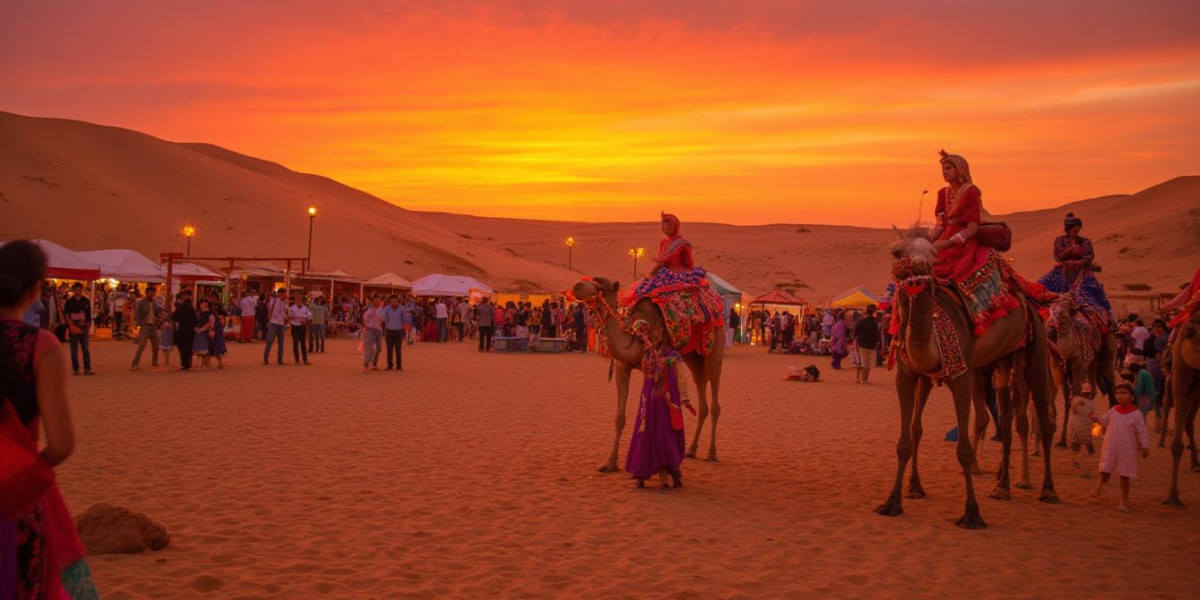The History Behind the Desert Festival Jaisalmer Holiday
Jaisalmer, famously known as the Golden City, is a historical gem in the heart of Rajasthan. Nestled amidst the Thar Desert, it is renowned for its golden sandstone architecture, grand forts, intricate havelis, and vibrant cultural heritage. But beyond its scenic beauty lies a tradition that brings the city alive every year—the Desert Festival. For travelers seeking a unique blend of culture, history, and celebration, a Desert Festival Jaisalmer Holiday is an experience that remains unmatched.
Origins of the Desert Festival
The Desert Festival of Jaisalmer has its roots in the local traditions of Rajasthan. Originally conceived as a way to honor the region’s rich folk culture, the festival was designed to bring together communities from across the Thar Desert. Historically, the festival served multiple purposes—it was a celebration of the end of the harvest season, an opportunity to pay tribute to local deities, and a platform for nomadic tribes to showcase their artistic talents.
The festival was institutionalized in the 20th century to promote tourism while preserving the local culture. Over the years, it has evolved into a grand event that attracts thousands of visitors from across India and around the world. Today, it is celebrated annually during the months of February, when the desert climate is at its most pleasant.
Significance of the Festival
The Desert Festival is more than just a celebration; it is a vibrant display of Jaisalmer’s living heritage. It symbolizes the harmony between humans and nature, highlighting the ingenuity of desert communities who have survived in harsh conditions for centuries. The festival showcases traditional music, dance, and art forms, allowing visitors to immerse themselves in Rajasthan’s colorful culture.
Moreover, the festival promotes tourism and economic development in the region. Local artisans, performers, and traders benefit from the influx of visitors, ensuring that the cultural heritage continues to thrive.
Cultural Extravaganza: Music and Dance
One of the highlights of a Desert Festival Jaisalmer Holiday is the wide array of traditional music and dance performances. Folk artists from the region gather to perform captivating acts that narrate stories of valor, romance, and devotion. The festival features popular Rajasthani dances such as Ghoomar and Kalbelia, performed in vibrant attire adorned with mirrors, beads, and intricate embroidery.
Traditional instruments like the dhol, sarangi, and kamaycha fill the desert air with enchanting melodies. The rhythmic beats of the dhol resonate with the heartbeat of the desert, while the soulful tunes of the sarangi evoke the timeless stories of Rajasthan. Tourists often find themselves swaying to the music, fully absorbed in the cultural atmosphere.
Camel Pageants and Equestrian Events
No Desert Festival is complete without camel pageants and equestrian events. Camels, known as the ships of the desert, hold immense significance in Jaisalmer’s history. During the festival, beautifully decorated camels parade through the desert, showcasing their vibrant attire and elaborate ornaments. Visitors can witness camel races, camel polo, and even camel beauty contests, which add a playful yet competitive dimension to the festival.
Equestrian events are another major attraction. Skilled riders perform daring feats on horseback, demonstrating their mastery and agility. These events are rooted in the martial traditions of Rajasthan, where horsemanship was essential for defense and mobility.
Traditional Crafts and Art
The Desert Festival is also an opportunity to experience the rich craftsmanship of Jaisalmer. Local artisans display their skills in pottery, textile weaving, and jewelry making. Tourists can purchase handmade souvenirs, including intricately carved wooden artifacts, embroidered fabrics, and silver jewelry.
The festival provides a platform for the preservation of these traditional arts. Many artisans pass down their skills from generation to generation, ensuring that the craft continues to thrive. For visitors, it is an opportunity to not only appreciate these art forms but also support local communities.
Culinary Delights
A Desert Festival Jaisalmer Holiday is incomplete without savoring the region’s distinctive cuisine. Traditional Rajasthani dishes such as dal baati churma, gatte ki sabzi, and ker sangri are served at various food stalls during the festival. Visitors can also enjoy local sweets like mawa kachori and ghevar, which add a delightful end to the meal.
The culinary experience at the festival is a reflection of the desert lifestyle—simple yet flavorful, designed to provide sustenance in a harsh climate. For food enthusiasts, tasting authentic Rajasthani cuisine during the festival is an unforgettable experience.
Nighttime Festivities and Cultural Immersion
As the sun sets over the desert, the festival transforms into a magical spectacle. Campfires light up the sandy landscape, and cultural performances continue under the star-studded sky. Folk singers, dancers, and storytellers gather around, sharing tales of valor, love, and mysticism.
Visitors often spend the night in traditional desert camps, experiencing life in the Thar Desert firsthand. The serene environment, coupled with the vibrant festivities, creates a sense of connection with nature and local culture. Staying overnight allows travelers to witness the desert in its purest form, from sunrise to sunset.
Tourism and Economic Impact
The Desert Festival has become a major driver of tourism in Jaisalmer. Thousands of visitors from across India and abroad flock to the city each year, boosting the local economy. Hotels, resorts, and tour operators see significant demand during the festival period, making it a vital event for the hospitality industry.
Brands like Adotrip provide specialized packages for travelers seeking a comprehensive festival experience. These packages often include guided tours, desert safaris, cultural shows, and luxury accommodations, ensuring that visitors enjoy a seamless and memorable holiday.
Planning a Desert Festival Jaisalmer Holiday
Planning a Desert Festival Jaisalmer Holiday requires careful preparation. The festival usually takes place in February, when temperatures are mild, making it the ideal time for desert exploration. Visitors should book accommodations in advance, as hotels and camps fill up quickly during the festival season.
It is also recommended to plan for desert safaris, cultural tours, and evening performances. Local guides provide insights into the history and significance of various events, enhancing the overall experience. Travelers can choose from budget, mid-range, or luxury packages based on their preferences and needs.
Experience Beyond the Festival
While the Desert Festival is the highlight, Jaisalmer offers numerous attractions year-round. The Jaisalmer Fort, Patwon Ki Haveli, and Salim Singh Ki Haveli are architectural marvels that reflect the city’s rich history. Visitors can also explore the Sam Sand Dunes, enjoy camel rides, and witness stunning sunsets over the desert landscape.
By combining festival experiences with sightseeing, travelers gain a holistic understanding of Jaisalmer’s culture and history. Brands like Adotrip ensure that tourists enjoy a balanced itinerary, blending festival excitement with cultural exploration.
Why Choose Adotrip for Your Desert Festival Holiday
Planning a memorable Desert Festival Jaisalmer Holiday is made easy with Adotrip. The brand specializes in curated travel experiences, providing hassle-free bookings, knowledgeable guides, and comfortable accommodations. From desert safaris to cultural shows, Adotrip ensures that every aspect of the holiday is seamless and enjoyable.
By choosing Adotrip, travelers benefit from local expertise, personalized itineraries, and access to exclusive experiences. Whether you are visiting Jaisalmer for the first time or returning to explore the festival anew, Adotrip guarantees a holiday filled with memories, culture, and adventure.
Conclusion
The Desert Festival of Jaisalmer is more than just an event—it is a celebration of heritage, culture, and community. From folk music and dance to camel pageants and artisan displays, every element of the festival tells a story of the desert and its people. A Desert Festival Jaisalmer Holiday offers a rare opportunity to immerse oneself in the traditions of Rajasthan while enjoying the breathtaking beauty of the Thar Desert.
For travelers seeking an unforgettable cultural journey, planning a trip with Adotrip ensures a well-rounded and enriching experience. From historical insights to vibrant festivities and comfortable accommodations, every moment of the festival becomes a memory to cherish for a lifetime.
FAQ – Desert Festival Jaisalmer Holiday
1. What is the Desert Festival Jaisalmer Holiday?
The Desert Festival Jaisalmer Holiday is an annual cultural event held in Jaisalmer, Rajasthan, celebrating the region’s folk traditions, music, dance, camel pageants, and arts. It offers tourists a unique opportunity to experience Rajasthan’s vibrant desert culture firsthand.
2. When is the best time to visit Jaisalmer for the Desert Festival?
The festival is typically celebrated in February when the desert climate is pleasant, making it ideal for sightseeing, desert safaris, and participating in festival activities.
3. How long does the Desert Festival last?
The Desert Festival usually lasts for three days. Each day features different cultural programs, including folk performances, camel races, equestrian events, traditional crafts exhibitions, and food fairs.
4. What are the main attractions during the Desert Festival?
The key attractions include:
Traditional Rajasthani music and dance performances (Ghoomar, Kalbelia)
Camel pageants, races, and beauty contests
Equestrian events and horse riding displays
Local crafts and artisan exhibitions
Traditional Rajasthani cuisine and food stalls
5. Can tourists participate in desert safaris during the festival?
Yes, desert safaris are a major part of the festival experience. Visitors can enjoy camel rides, jeep safaris, and explore the Sam Sand Dunes while witnessing the desert landscape at sunrise and sunset.
6. Is the festival suitable for families and children?
Absolutely. The Desert Festival Jaisalmer Holiday is family-friendly and offers activities that cater to all age groups, including cultural shows, camel rides, craft workshops, and storytelling sessions around the desert campfires.
7. What should I wear for the Desert Festival?
Light, breathable clothing is recommended during the day due to the desert heat, while evenings can be cooler, so carrying a light jacket or shawl is advisable. Comfortable footwear is also essential for walking on sand and exploring festival venues.
8. How can I book a Desert Festival Jaisalmer Holiday package?
Travelers can book festival packages through travel brands like Adotrip, which offer curated itineraries including accommodation, guided tours, desert safaris, cultural performances, and meals. Booking in advance is recommended due to high demand during the festival.
9. Are there any special cultural etiquettes to follow during the festival?
Visitors should respect local customs, ask for permission before taking photographs of performers or locals, and avoid littering. Participating with an open mind and enthusiasm enhances the cultural experience.
10. What makes the Desert Festival unique compared to other festivals in India?
The Desert Festival is unique because it combines traditional Rajasthani folk culture, desert lifestyle, and vibrant performances against the stunning backdrop of the Thar Desert. The camel pageants and desert-based activities make it a one-of-a-kind experience not found elsewhere in India.
11. Can I combine the Desert Festival with sightseeing in Jaisalmer?
Yes. While the festival is the main attraction, tourists can explore iconic sites like Jaisalmer Fort, Patwon Ki Haveli, Salim Singh Ki Haveli, Gadisar Lake, and the sand dunes. Brands like Adotrip offer packages that combine festival attendance with sightseeing tours.
12. Is the Desert Festival accessible for international travelers?
Yes, international tourists frequently visit Jaisalmer for the festival. English-speaking guides and structured travel packages ensure a smooth and enjoyable experience for global visitors.
13. What is the significance of camels in the Desert Festival?
Camels, known as the “ships of the desert,” are central to Rajasthan’s culture and heritage. During the festival, decorated camels participate in pageants, races, and beauty contests, symbolizing desert life and nomadic traditions.
14. How does the festival support local communities?
The festival promotes tourism, providing income for local artisans, performers, guides, and hospitality businesses. It helps preserve traditional crafts, music, and dance forms, ensuring the continuity of Rajasthan’s cultural heritage.
15. Can I experience the Desert Festival if I have only one day in Jaisalmer?
While attending all events in one day may be challenging, a well-planned one-day itinerary with Adotrip can allow visitors to enjoy major performances, camel rides, and a cultural tour of the city.












